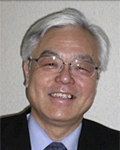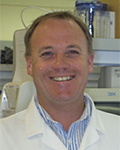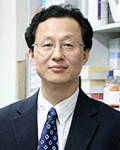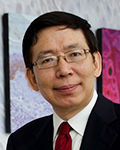Invited Speakers
Some of lecture titles are tentative and subject to change.
●Opening Lecture 1November 28, 2019

Perspective on polyphenol research in human health
Junji TeraoFaculty of Clinical Nutrition and Dietetics
Konan Women's University
Japan Short Biography
Biography

Junji Terao
Faculty of Clinical Nutrition and Dietics
Konan Women's University
Japan
Faculty of Clinical Nutrition and Dietics
Konan Women's University
Japan
Junji Terao, Ph.D. is a Professor in the Faculty of Clinical Nutrition and Dietetics at Konan Women’s University and Professor Emeritus of Tokushima University. He received his Ph.D in Kyoto University and worked in Research Institute for Food Science, Kyoto University and Oklahoma Medical Research Foundation. In 1989, he started polyphenol research in National Food Research Institute, Ministry of Agriculture, Forestry and Fishery Japan. In 1997, he joined Department of Nutrition, Tokushima University School of Medicine. His research interests are bioavailability and physiological function of dietary polyphenols and pathophysiological function of lipid peroxidation products. He published more than 240 peer-reviewed scientific papers. He organized and chaired 3th International Conference on Polyphenols and Health (3rd ICPH) in Kyoto, Japan. He is a previous editor-in Chief of BioFactors and a previous president of Japanese Society of Food Factors.
●Opening Lecture 2November 28, 2019

Metabolomics for assessment of true exposure to phytochemicals and consideration of individual metabotypes
Claudin ManachINRA Clermont-Ferrand
France Short Biography
Biography

Claudin Manach
INRA Clermont-Ferrand
France
INRA Clermont-Ferrand
France
After >12 years of research on the bioavailability of polyphenols, my interests focus on nutritional metabolomics to 1) identify new biomarkers of plant food intake and improve tools and methods for assessment of true internal exposure to polyphenols and other phytochemicals, 2) link individuals’ dietary and phytochemical exposures to health outcomes (ex: cognitive decline) in epidemiological studies, 3) identify the main determinants of interindividual variation in ADME of food phytochemicals (COST Action POSITIVe, COB study). I developed PhytoHub, an online database on food phytochemicals and their metabolites and participated with D. Wishart’s team on Biotransformer, an in-silico tool for metabolism prediction.
●Plenary Lecture 1November 29, 2019
Flavonoid induced cognition: Intake requirements and the role of the vascular system
Jeremy SpencerUniversity of Reading
UK Short Biography
Biography
Jeremy Spencer
University of Reading
UK
University of Reading
UK
●Plenary Lecture 2November 29, 2019

Polyphenols at the gastrointestinal tract: impact on metabolic disorders
Patricia OteizaUniversity of California, Davis
USA Short Biography
Biography

Patricia Oteiza
University of California, Davis
USA
University of California, Davis
USA
●Plenary Lecture 3November 30, 2019

Metabolomics based dietary biomarkers in Nutritional Epidemiology. Challenges & opportunities in polyphenol research
Cristina Andres-LacuevaPharmacy & Food Science School
University of Barcelona
Spain Short Biography
Biography

Cristina Andres-Lacueva
Pharmacy & Food Science School
University of Barcelona
Spain
Pharmacy & Food Science School
University of Barcelona
Spain
Cristina Andres-Lacueva is Associate Professor at the Nutrition, Food Science&Gastronomy Department of the Pharmacy and Food Science Faculty at the University of Barcelona-UB and leader of the Biomarkers&Nutritional and Food Metabolomics research group. Posdoctoral Research at Tufts University/HNRCA (Boston). IP in CIBERFES-isciii, Biomedical Research Network on Frailty and Healthy Aging. Author of over 190 peer-reviewed papers. She is partner of an Innovation by Design project, CooK2Health and Coordinator of the INJOY Campus Activity both from EIT-Health/H2020. Active participation on the EU-Joint Programming Initiative a Healthy Diet for a Healthy Life JPI-HDHL Actions Biomarkers, Microbiomics, Nutrition and Cognition and INTIMIC.
●Plenary Lecture 4November 30, 2019

Mechanistic insights on the action of polyphenols against type 2 diabetes from in vitro cellular and in vivo intervention studies
Gary WilliamsonMonash University
Australia Short Biography
Biography

Gary Williamson
Monash University
Australia
Monash University
Australia
Head of Department of Nutrition, Dietetics and Food at Monash University, Melbourne, Australia, since October 2018, with more than 360 peer-reviewed full scientific papers and highly cited author. After Insititute of Food Research in Norwich, UK, moved to Nestle Research Center in Lausanne, Switzerland, then Chair and Professor at University of Leeds, UK from 2007 until October 2018. Current interests in the effects of dietary phytonutrients on health, both their bioavailability and effects on metabolic syndrome and type 2 diabetes risk.
●Plenary Lecture 5December 1, 2019

Whodunnit? Teasing apart the effects of ingested polyphenols versus their gut microbiota metabolites
Paul KroonQuadram Institute Bioscience
UK Short Biography
Biography

Paul Kroon
Quadram Institute Bioscience
UK
Quadram Institute Bioscience
UK
Dr Paul Kroon is leader of the Polyphenols and Health Group at the Quadram Institute (formerly the Institute of Food Research). His research focusses on understanding the mechanisms by which dietary polyphenols are absorbed and exert health benefits. This knowledge is also used to inform the development of foods with health benefits that are supported by scientific evidence. Dr Kroon coordinated the EU FP7 BACCHUS project that focussed on developing the science to support health claims for food products containing bioactive peptides and polyphenols (http://www.bacchus-fp7.eu/), and has been a partner in several other European projects including FP6-FLAVO, FP6-BaSeFood, FP7-ATHENA and is currently a partner in the JPI-Healthy Diet for a Healthy Life project MaPLE that is investigating the effect of a polyphenol-rich dietary pattern on intestinal permeability in the elderly. He organised the successful 1st International Conference on Food Bioactives and Health held (September 2016) and Bioavailability 2018 conferences in Norwich. He is an editor for the Mol Nutr Food Res and Nutrire journals and has published more than 165 refereed publications.
●Plenary Lecture 6December 1, 2019

Development of functional green tea and the use of functional food labeling system in Japan
Mari Maeda-YamamotoNational Agriculture and Food Research Organization
Japan Short Biography
Biography

Mari Maeda-Yamamoto
National Agriculture and Food Research Organization
Japan
National Agriculture and Food Research Organization
Japan
Mari Maeda-Yamamoto, Ph.D. is Administrator of Research Management of National Agriculture and Food Research Organization (NARO). She received her Ph.D in Kyushu University in 1992. In 1986, she worked in Ministry of Agriculture, Forestry and Fishery Japan, Director of Food Function Research Division, Food Research Institute in 2012, and Director of Agri-Food Business Innovation Center in 2018. She is research expertise in physiological functions of green tea polyphenol, major emphasis on immunological regulation and development of agricultural products as Foods with Function Claim. She published more than 160 peer-reviewed papers, 80 reviews, and 28 patents. She is conducting a research project aimed at promoting heath care utilizing food.
●Keynote Lecture 1December 1, 2019

Anticarcinogenic and chemopreventive substances in food: An update
Young-Joon SurhDirector & Professor
Tumor Microenvironment Global Core Research Center
College of Pharmacy, Seoul National University
Korea Short Biography
Biography

Young-Joon Surh
Director & Professor
Tumor Microenvironment Global Core Research Center
College of Pharmacy, Seoul National University
Korea
Director & Professor
Tumor Microenvironment Global Core Research Center
College of Pharmacy, Seoul National University
Korea
Professor Young-Joon Surh currently serves as Director of Tumor Microenvironment Global Core Research Center, Seoul National University. He graduated from College of Pharmacy, Seoul National University with BS and MS degrees, and earned a PhD degree at the University of Wisconsin-Madison followed by postdoctoral training at MIT. Prof. Surh worked as a tenure-track Assistant Professor at Yale University School of Medicine, before relocation to Korea. Prof. Surh’s research focuses on the molecular mechanisms of cancer chemoprevention with natural products. Prof. Surh has published more than 350 papers in peer-reviewed international journals. The total number of citations of his publications is about 20,000 with the H-Index 75. Prof. Surh received numerous awards including McCormic Science Institute Award from American Society for Nutrition and the Distinguished Scientist Award given by President of South Korea. He currently serves as President of Korean Society for Molecular and Cellular Biology, the largest academic society in the biomedical area in Korea.
●Keynote Lecture 2December 1, 2019

Cancer prevention by food-derived phytochemicals
Zigang DongThe Hormel Institute
The University of Minnesota
USA Short Biography
Biography

Zigang Dong
The Hormel Institute
The University of Minnesota
USA
The Hormel Institute
The University of Minnesota
USA
Dr. Dong has a Doctor of Public Health degree from Columbia University in New York and post-doctoral training at the National Cancer Institute. He has served as a member on many grant application review study sections with the National Institutes of Health and has published more than 350 articles in prestigious journals such as Nature, Nature Structure and Molecular Biology, Nature Cancer Reviews, Science Signaling, Cancer Research, PNAs, and Molecular Cell. He also serves as a member of editorial board, editor or associate editor of several journals including Cancer Research, Carcinogenesis, Molecular Carcinogenesis, Cancer Prevention Research, and JBC. He has many years of experience and is a world leader in the elucidation of molecular mechanisms of carcinogenesis, cancer development and prevention. His research interests include the identification of molecular and cellular mechanisms and targets in carcinogenesis and chemoprevention.
●Keynote Lecture 3December 1, 2019

Novel physiological function of bile acid and a food factor that mimics its function
Ryuichiro SatoProfessor
Department of Applied Biological Chemistry
The University of Tokyo
Japan Short Biography
Biography

Ryuichiro Sato
Professor
Department of Applied Biological Chemistry
The University of Tokyo
Japan
Professor
Department of Applied Biological Chemistry
The University of Tokyo
Japan
<Biography>
- 1980
- Graduated from The University of Tokyo
- 1985
- Ph. D. degree at The University of Tokyo
- 1986
- Assistant Professor at Teikyo University
- 1990
- Research fellow at University of Texas Southwestern Medical Center
- 1994
- Lecturer at Teikyo University
- 1995
- Associate Professor at Osaka University
- 1999
- Associate Professor at The University of Tokyo
- 2004
- Professor at The University of Tokyo
●Keynote Lecture 4December 1, 2019

Contribution of plant food bioactives in promoting health effects of plant foods ? why look at interindividual variability?
Christine MorandNational Institute for Agricultural Research (INRA), France
Department of Human Nutrition – University of Clermont-Auvergne.
France Short Biography
Biography

Christine Morand
National Institute for Agricultural Research (INRA), France
Department of Human Nutrition – University of Clermont-Auvergne.
France
National Institute for Agricultural Research (INRA), France
Department of Human Nutrition – University of Clermont-Auvergne.
France
Christine MORAND is full research director at INRA, in the Human Nutrition Unit of Clermont-Ferrand, where she leads a group focusing on plant food bioactives and vascular health. She is working for more than fifteen years in the field of Nutrition & Health, to establish the role of dietary polyphenols in the prevention of cardiovascular diseases through a translational approach, combining human intervention studies, animal experiments and mechanistic studies. She belonged to the INRA research groups’ that has initiated the 1st International Conference on Polyphenols and Health (Vichy, 2003) and in 2015 she chaired its 7th edition (Tours, France). She also chaired the COST-Action POSITIVe-FA1403 (2014-2018), addressing the complexity of the interindividual variation in response (bioavailability and bioactivity) to the consumption of plant food bioactives in relation to cardiometabolic health (http://www6.inra.fr/cost-positive). Currently, she is the Chief Editor of the journal Food and Function (Royal Society of Chemistry, Cambridge, UK).
●Keynote Lecture 5December 1, 2019

Dietary polyphenols for cardiovascular health
Kevin D CroftPhD, University of Western Australia, 1978
Fellow of the Royal Society of Chemistry
Australia Short Biography
Biography

Kevin D Croft
PhD, University of Western Australia, 1978
Fellow of the Royal Society of Chemistry
Australia
PhD, University of Western Australia, 1978
Fellow of the Royal Society of Chemistry
Australia
Prof Kevin Croft is a Professorial Fellow and Head of Division of Cardiovascular Science in the School of Biomedical Science at the University of Western Australia. He has active research interests in nutritional biochemistry, biomarkers of oxidative damage, the pathogenesis of atherosclerosis and the mechanism of vascular protection by dietary polyphenols. He has served as the Editor-in-Chief of the Royal Society of Chemistry journal Food and Function from 2013-2017. He has over 300 peer reviewed publications. He was on the advisory group that put together the National Heart Foundation of Australia position statement on "Antioxidants in foods, drinks and supplements for cardiovascular health" .
●Keynote Lecture 6December 1, 2019

Phenolipids in food: bioactivities and health effects
Fereidoon ShahidiMemorial University of Newfoundland
Canada Short Biography
Biography

Fereidoon Shahidi
Memorial University of Newfoundland
Canada
Memorial University of Newfoundland
Canada
Dr. Fereidoon Shahidi, earned his PhD in physical-organic chemistry from McGill University in 1977 and was a senior research associate and an adjunct professor at the University of Toronto. In 1987, he joined the Department of Biochemistry at Memorial University of Newfoundland (MUN) where he now serves as a University Research Professor, the highest academic level at MUN. He is the author of over 850 research papers and book chapters, has authored or edited 76 (7 in press) books, and 10 patents. His findings have advanced the frontiers of research in lipid, lipid oxidation and its prevention, phenolics and antioxidants. He has received numerous awards from different societies and has served on and chaired many committees, both nationally and internationally. He is currently the elected chair and a former member of the Scientific Council of the International Union of Food Science and Technology (IUFoST). Dr. Shahidi serves as the editor-in-chief of the Journal of Food Bioactives and the journal of Food Production, Processing and Nutrition. Shahidi is the principal founder of the International Society for Nutraceuticals and Functional Foods (ISNFF) and Founding Editor-in-Chief of the Journal of Functional Foods for which he served in that capacity for 10 years. He served as an editorial board member and an Editor of Food Chemistry for a quarter of a century. He was also the principal founder of the Nutraceutical and Functional Food Division of IFT. Professor Shahidi has served as a member of the Expert Advisory Panel of Health Canada on Standards of Evidence for Health Claims for Foods, and a member of the Washington-based Council of Agricultural Science and Technology on Nutraceuticals. He has also trained numerous graduate students, postdoctoral fellows, research associates and scholars from around the globe who are now his colleagues in over a dozen countries in 5 continents.



















